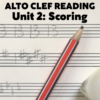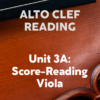The Orchestration Online Facebook group is a great place for developing composers to share the works-in-progress and get constructive feedback. However, we do have a problem. For many more experienced members like myself, who may be expected to comment from the perspective of a teacher and/or a professional, it can be daunting to have several very long, quite intense works show up on the same day or in the same week. We can feel overwhelmed at the prospect of commenting on even one of these works. Or we’ll start in and do our best, but run out of time after saying a few comments on the first one we see.
It all boils down to “why.” Why are you, the Orchestration Online member, posting your work? I think it really helps to be clear about this. If you’re posting for everyone’s enjoyment, or to let the world know about what you’re doing, then continue to post whatever you want, in any way. We have many members who post nearly everything they compose. But if you’re sharing your work specifically to get feedback from me and the other pro orchestrators and teachers, then I recommend the following guidelines:
- State clearly that you want feedback, along with any specific problem if there is one.
- Limit your post to 3-5 PDF pages of full score.
- (optional) Include linked audio for a wider range of feedback from members.
The strategy here is to really focus on the section of your piece which needs the most work. It’s all very well for us to look through the good bits as well, but it doesn’t help you in the long run. It’s better if you take the part about which you’re less certain, and share that. It forces us to stay on the topic as well, and not get side-tracked over a section that you may have already fixed, rewritten, or know how you want to change.
Over the past two years, the Orchestration Online Facebook group has grown to an astonishing 10,000+ members. I’m quite honoured to be hosting such a huge group with so many different points of view. Recently, I’ve noticed that members are sharing audio tracks far more than scores, and many times these tracks aren’t orchestrated music. While I have no problem with these posts, I do have to point out that other than pointing out production values, structure, arranging, quality of performance, and so on, I really have nothing to share about the orchestration of the post. You’re not getting the best of what I could offer in that odd moment of the day.
Furthermore, there’s the time element. I’m a trained orchestrator. That means I can look at a page of score and in a couple of seconds form an impression of how it sounds, and what may be right or wrong about it. To explain what all that means might take an hour or more, but at least the process of looking at the page is the fastest for me – exponentially faster than sitting through the whole audio track.
Finally, consider this if you’ve only been sharing audio files of your orchestration: there’s simply no way for anyone to state with exact certainty that your piece is well-orchestrated by listening to a mockup. It may sound great to the ear, but your score may have some glaring flaws in it. Likewise, your mockup might sound horrible, but the score from which it’s derived may be excellently conceived. All the same, it’s good to include an audio link of the specific passage along with your PDF file so that members of all perspectives can offer feedback as well.
Even if you follow these guidelines, there’s no guarantee that the right person might be available at the right time to review your piece. But please don’t give up – continue to share your works, and offer your own feedback to your fellow members. I look forward to reviewing more scores in this community that’s become a home for so many orchestrators and composers.








